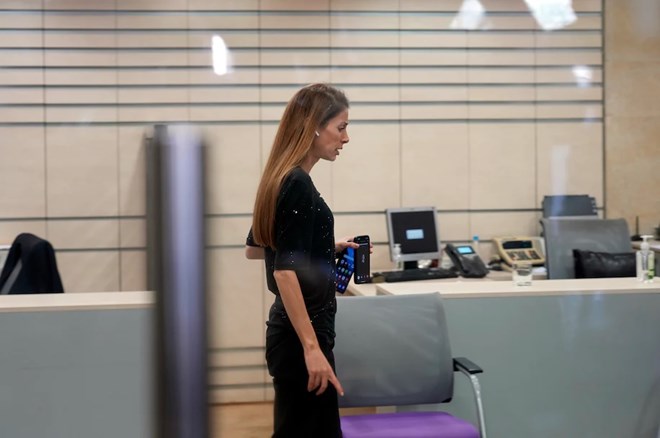
Wednesday October 5, 2022
By Kareem Chehayeb
Beirut legislator Cynthia Zarazir speaks on the phone as she walks inside a Byblos Bank branch near the capital Beirut, demanding $8,500 from her savings to cover expenses for a surgery, in Antelias, Lebanon, Wednesday, Oct. 5, 2022. Cash-strapped Lebanon in recent weeks has witnessed a surge in depositors storming bank branches to forcefully withdraw their locked savings, as the country’s economy continues to spiral. On Tuesday, depositors stormed at least four banks, two of which were armed. (AP Photo/Bilal Hussein)
BEIRUT — A Lebanese parliamentarian on Wednesday entered a bank branch near Beirut, demanding some of her trapped savings to cover medical expenses.
Cash-strapped Lebanon in recent weeks has witnessed a surge in depositors storming bank branches to forcefully withdraw their locked savings as the country’s economy continues to spiral. On Tuesday, depositors stormed at least four banks, two of which were armed.
Lebanon’s cash-strapped banks have imposed informal limits on cash withdrawals since late 2019. Since then, three-quarters of the population plunged into poverty, and the Lebanese pound lost some 90% of its value against the dollar.
Beirut legislator Cynthia Zarazir entered a Byblos Bank branch near the capital, demanding $8,500 from her savings to cover expenses for a surgery.
“I am a Lebanese citizen demanding my rights in light of this exceptional situation,” Zarazir told the press and bystanders.
Her lawyer Fouad Debs, a member of legal and advocacy group the Depositors’ Union, told The Associated Press that the bank initially proposed a “ridiculous” proposal to withdraw her savings in Lebanese pounds at a fraction of its dollar value.
Hours later, Zarazir left the bank having secured the money she needed for her surgery.
Meanwhile, dozens of protesters scuffled with riot police at the Central Bank’s headquarters in Beirut. Protesters hurled rocks and molotov cocktails towards the building, and set ties on fire at the entrance.
And in Byblos, a man fired an assault rifle at the glass facade of a bank branch, after employees did not let him in without an appointment.
Another man stormed a bank branch in the southern Beirut suburb of Dahiyeh demanding some of his trapped savings. According to depositors’ advocacy groups, he was unarmed.
The general public has commended the bank heists, some even hailing the perpetrators as heroes. Among the most notable cases was Sally Hafez, who last month stormed a Beirut bank branch with a fake pistol and gasoline canister to take some $13,000 to fund her 23- year-old sister’s cancer treatment.
The banks meanwhile have condemned the angry depositors’ actions, and said in a statement Tuesday that the Lebanese government is primarily to blame for the crisis. Last month, the banks closed for a week after at least seven banks were raided, and have since only partially reopened.
Debs, who alongside the Depositors’ Union has tried to help depositors unlock their trapped savings, said that the situation is no longer bearable and that Lebanon needs to reform its economy to become viable again.
“What we want is a collective solution which would be through a recovery plan that’s fair, comprehensive, transparent, and includes the restructuring of the banks and public debt,” Debs told the AP, adding that the politicians and bankers should be held accountable for the crisis.
Lebanon for over two years has been struggling to reach an agreement with the International Monetary Fund for a bailout program. The country’s government and divided parliament have stalled over about a dozen mandatory reforms ever since they reached a tentative agreement in April, including restructuring its banks, implementing formal capital controls, and reforming its outdated bank secrecy laws. The United Nations and IMF have both criticized Lebanon for its sluggish progress.